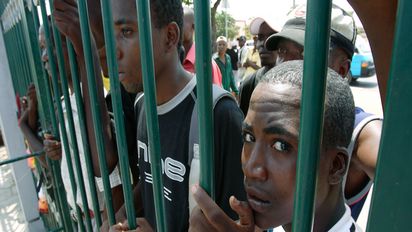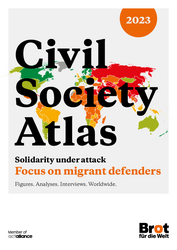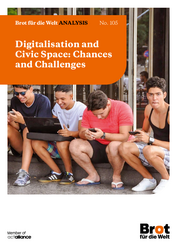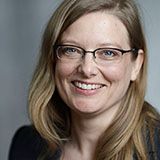
No Development without Human Rights
Almost all countries in the world have committed themselves to universal human rights, but only very few fully protect the rights of their population. Brot für die Welt (Bread for the World) and its partner organisations work towards the worldwide fulfilment of human rights.
Born Equal in Rights
In reaction to the horrors of the Second World War with up to 70 million deaths, the world community adopted the Universal Declaration of Human Rights in 1948. The declaration is based on the principle of universality and makes clear that all human beings have the same rights to ensure that the barbarism of the Second World War does not occur again. Since then, the United Nations have adopted nine human rights conventions that have been ratified by up to 193 states. Despite these efforts, violations of human rights are still widespread.
“
„All human beings are born free and equal in dignity and rights.“
Universal Declaration of Human Rights 1948
Who is affected by human rights violations?
Human rights violations can happen to anyone: small-scale farmers, owners of houses or land, workers or activists. Particularly affected are persons in vulnerable situations – like refugees – or persons who belong to marginalised and poor communities.
Often, human rights violations are linked to business activities. This is the case when local communities are displaced because a company opens a mine site, plantation or a dam on their land, or if industrial waste and toxic pesticides are contaminating their soil and water resources.
Industrialised countries contribute to this situation to a significant extent. In many cases, the companies which invest in development countries and exploit the local resources and workers have their headquarters in Germany or other European countries. Many of our everyday items – textiles, foodstuffs, cell phones and laptops – are produced under conditions that constitute human rights violations. For those affected it is very difficult to raise their voices and obtain justice.
Shrinking Space for Civil Society
Throughout the world, civic engagement is linked to ever-higher levels of risk. Activists, employees and volunteers working for associations, NGOs and social movements are increasingly being threatened, arrested and even murdered. In addition, their organisations face systematic restrictions on their ability to conduct their work. They may have their registrations or licenses withdrawn or simply be outlawed. In fact, more and more countries are establishing laws or adapting existing legal frameworks to make civic engagement almost impossible. Today, only four per cent of the world population live in countries where they can fully enjoy their civic freedoms. Countries which silence independent voices and massively violate people’s freedom of opinion, assembly and association, typically face grave difficulties in terms of their political, economic and social development.
What needs to be done?
A vibrant democracy that aims to fight poverty and to secure human rights needs a strong, independent civil society. It is involved in and critically accompanies democracy in the country. This is the only way of ensuring that poor and vulnerable people can gain a voice and that the fruits of development and economic growth reach them instead of merely benefiting the privileged.
In order to be strong and resist Shrinking Space civil societies need to form networks of solidarity. Governments, especially those of powerful states like Germany, need to speak up against the repression of civil society and show the harmful effects of this trend on international level. Germany also needs to lead by example by paying particular attention to civil society engagement, to the defence of a world order that puts human rights before business interests and to the respect of international institutions such as the United Nations (UN) and its organs. Thereby, the German government needs to do more than rely on businesses to voluntarily choose to respect human rights and the environment in the countries, where they operate.
What we need is a world order that is determined by binding regulations with which everyone must comply. Moreover, when such laws are ignored or undermined, people need the opportunity to voice concerns, peacefully protest and defend themselves in the courts.
What Brot für die Welt Does
We stand by NGOs in the Global South when state or non-state actors violate human rights. Together with our partner organisations from more than 80 countries worldwide we document human rights violations and the shrinking space for civil society engagement.
We organise regional consultations to enable affected organisations to share experiences and develop common counter-strategies. We use the mechanisms of the UN Human Rights Council to garner international attention for human rights violations and the repression of civic freedoms. And we fund trips made by partners for lobby and advocacy work before the UN bodies in Geneva or the EU institutions in Brussels.
We help to protect human rights defenders through security trainings, urgent actions, the organisation of diplomatic support and an emergency fund that we use to cover legal aid, secure escort as well as medical and psychological care. We campaign for the rights of migrants and refugees around the world and demand that they receive protection during their flight.
We involve ourselves in politics in our own country and on the EU-level and bring the issues of our partner organisations to attention. And we demand from the German government and the EU that they pursue policies consistent with their human rights obligations. This includes the support of processes, for example a binding treaty on business and human rights, that seek to establish mandatory human rights standards for global business enterprises.
Downloads





